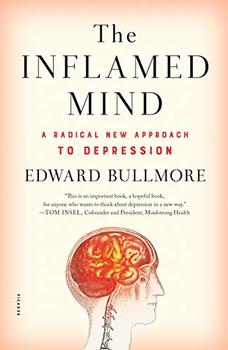Summary | Excerpt | Reviews | Beyond the Book | Readalikes | Genres & Themes | Author Bio

A Radical New Approach to Depression
by Edward Bullmore
Why is a depressed patient inflamed in the first place? And why should the body’s inflammatory response, which is supposed to be on our side, which has evolved to help us win the battle against disease, be causing us to feel depressed?
Back when I met Mrs P, about 30 years ago, these questions about causality were almost unasked and there were no good scientific or medical answers to them.
By the time of my root canal surgery in 2013, the questions were being asked much more often, and more precisely, and the answers were becoming clearer, thanks to the work of a disruptive new science, which has continued to make rapid progress in the last 5 years.
Like a lot of new science, this one has emerged at the interfaces between more established domains of knowledge. It exists at the boundaries between immunology, neuroscience, psychology and psychiatry. It goes by a variety of ungainly, often hyphenated names – like neuro-immunology or immuno-psychiatry – that speak to its hybrid origins and its transgressive ambitions to link brain, body and mind by the mechanisms of the immune system. Neuro-immunology investigates how the immune system interacts with the brain or nervous system; whereas immuno-psychiatry is more focused on how the immune system interacts with the mind and mental health.
Neuro-immunology and immuno-psychiatry
The first few people brave enough to call themselves neuro-immunologists were a tiny tribe regarded with some condes-cension and suspicion by more mainstream scientists. It wasn’t considered professionally respectable to investigate connections between the brain – the province of neuroscience – and the immune system – the province of immunology. Not respectable not least because it was well known in the 20th century that the brain and the immune system had nothing to do with each other. The white blood cells and antibodies of the immune system circulated in the bloodstream and could pass through the spleen and lymph nodes and various other immunologically important organs of the body. But the cells and proteins of the body’s immune system couldn’t percolate so freely through the brain because it was protected by something called the blood-brain barrier. The BBB, as it’s also known, was explained to me at medical school in the 1980s as something like a Berlin wall that kept the immune system completely apart from the nervous system. The solidity of the BBB exposed the nascent theories of neuro-immunology to the withering scorn of more traditionally minded scientists. How could neuro-immunologists seriously propose – as they began to do from about 1990 – that levels of inflammatory proteins measured by a blood test had anything to do with the brain or the mind, when it was well known that proteins couldn’t cross the barrier between blood and brain? It wasn’t just wrong; it was worse than that.
The Berlin wall concept of the BBB was the physical embodiment of powerful older ideas, the dualist ideas dating back to Descartes, that mind and body, as we now say, or soul and body, as he said, are utterly different. The 17th-century philosophy of Cartesian dualism is the foundational bedrock of Western scientific medicine. And the disembodiment of the brain by the rigid interdiction of the BBB was a concrete realisation of this philosophy. So when the pioneer neuro-immunologists proposed that inflammatory proteins in the blood could get across the BBB to have effects on the mind, they weren’t regarded merely as wrong about the biology but as deeply disrespectful of the philosophical underpinnings of scientific medicine.
It is now clear that a lot of what I was taught in medical school is wrong. It has become increasingly obvious that the existence of the BBB does not prohibit all immunological cross-talk between the brain and the body. We now know that inflammatory proteins in the blood, called cytokines, can send signals across the BBB, from the body to the brain and the mind. I will say more about cytokines later but if you’ve never heard of them before you can think of them as hormones which circulate in the bloodstream creating powerful inflammatory effects throughout the body, including the brain. So when the dentist started probing my gums and scraping my teeth, she would have caused immune cells in my mouth to produce cytokines, which then circulated throughout my body in my blood and communicated inflammatory signals across the supposedly impermeable BBB to reach the nerve cells in my brain and cause my mind to become inflamed.
Excerpted from The Inflamed Mind by Edward Bullmore. Copyright © 2018 by Edward Bullmore. Excerpted by permission of Picador. All rights reserved. No part of this excerpt may be reproduced or reprinted without permission in writing from the publisher.
Your guide toexceptional books
BookBrowse seeks out and recommends the best in contemporary fiction and nonfiction—books that not only engage and entertain but also deepen our understanding of ourselves and the world around us.